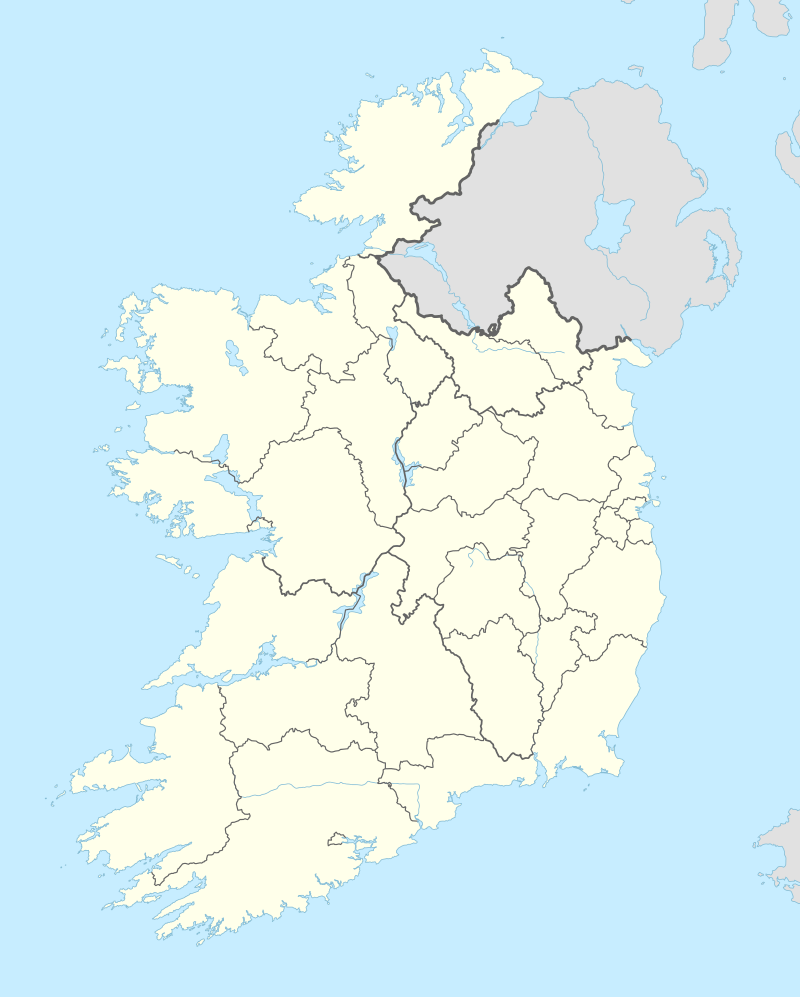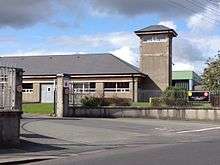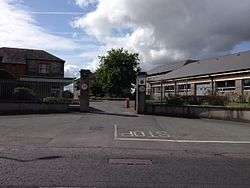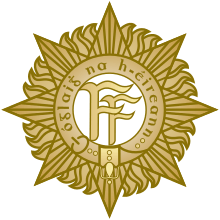Aiken Barracks
| Aiken Barracks | |
|---|---|
| Dún Mhic Aogáin | |
| Dundalk, County Louth | |
|
Main Entrance to Aiken Barracks | |
 Aiken Barracks Location within Ireland | |
| Coordinates | 54°00′17″N 6°22′53″W / 54.0048°N 6.3814°WCoordinates: 54°00′17″N 6°22′53″W / 54.0048°N 6.3814°W |
| Type | Barracks |
| Site information | |
| Controlled by | Irish Defence Forces/Department of Defence |
| Garrison information | |
| Garrison | 27 Infantry Battalion[1] |

Aiken Barracks (Irish: Dún Mhic Aogáin) is an army base located in Dundalk, County Louth, Ireland. The Barracks, which were originally known as Dundalk Barracks, were renamed after Frank Aiken a commander of the Irish Republican Army and an Irish politician. It is the current Headquarters of the 27 Infantry Battalion of the Irish Army.
History
1922
In April 1922 the 4th Northern Division commanded by Frank Aiken occupied Dundalk barracks as the British forces evacuated Free State territory under the terms of the Anglo-Irish Treaty.[2] The Irish Civil War began in June 1922 and on 16 July 1922 the pro-treaty 5th Northern Division led by Dan Hogan occupied Dundalk taking Aiken and his men prisoner. Just eleven days later on 27 July, some of Aiken’s IRA command under Padraig Quinn blew a hole in the wall of Dundalk prison and in fifteen minutes the operation resulted in the freeing of Republican prisoners, including Aiken himself.[2]
Aiken now prepared to free the remaining republican prisoners held in Dundalk barracks. Aiken’s troops were armed with small arms and explosives because they had been supplied up until a month before by the very Army they were now going to attack. Aiken organised boats to ferry his 300 strong force across the Castletown river into Dundalk and equipped two storming parties of ten men with submachine guns and explosives. The attack commenced at 4:00am on 14 August.[3] Though several mines failed to explode, one did blast in the back gate. The surviving sentries were machine-gunned and the walls breached. After the back gate was destroyed by the explosion Frank Aiken and about nine men rushed the breach and got through. A heavy fire was soon directed on to the attacking troops from some of the barrack rooms. However the attackers got the upper hand as prisoners were captured. Bags of explosives were thrown into the windows of the ground floors of the barrack rooms. When those exploded the inmates generally surrendered.[3] The attack had been successful and 400 rifles and a large volume of ammunition was captured.[4] In the process four Free State soldiers were killed and 350 captured but more than 200 Republican prisoners were released.[4]
The Emergency
During The Emergency 3 & 4 Cyclist Squadrons were based in Dundalk Barracks.[5]
27 Infantry Battalion

On 1 September 1973 the 27 Infantry Battalion was established.[6] From its activation the 27 Infantry Battalion's Headquarters, Headquarters Company and A Company have been based in Dundalk. In January 2009, B and Support Companies moved to Aiken Barracks when Monaghan Military Barracks closed. B Company has since 2012 been based in Gormanston Camp, County Meath. The 27 Infantry Battalion celebrated 40 years since its establishment with a parade in Dundalk town on 31 August 2013.[7]
Incidents
A female soldier referred to as an Irish Army Poster Girl made an allegation of being sexually assaulted by another soldier whilst based at Aiken Barracks.[8] Second Lieutenant Collette McBarron, a former Miss Ireland contestant,[8] made the allegation against a fellow serving soldier which resulted in a full investigation by Irish Military Police. Following extensive enquiries however, charges were dismissed as a result of lack of evidence.[8]
In the early hours of Monday 27 May 2013, an oil tanker containing illegal fuel which had been seized by the Irish Revenue Commissioners was stolen from Aiken Barracks and driven away.[9] The tanker was one of a number of vehicles which had been part of a seizure at an illegal oil-laundering plant in Drumacon, County Monaghan[9] and was subsequently stored at Aiken Barracks.[9] Thieves breached the security of the base and made off in the lorry, which contained 20,000 litres of fuel valued at €30,000,[9] and which was then driven at high speed through the main gates of the Barracks (which were locked at the time).[9] Soldiers who were on duty at the barracks entrance were taken by surprise and the main gates sustained substantial damage as a result of the incident.[9]
References
- ↑ "Army - Defence Forces". Retrieved 25 November 2014.
- 1 2 "Historic break-out from Dundalk Gaol recalled". Independent.ie. Retrieved 25 November 2014.
- 1 2 "Press Release - Transcript of Rescued Prisoners from Dundalk Jail Register, 14th August 1922". Retrieved 25 November 2014.
- 1 2 "Co. Kildare Online Electronic History Journal". Retrieved 25 November 2014.
- ↑ "Visit to Aiken Barracks". Irish centenary travel. Retrieved 9 October 2016.
- ↑ "Time to remember". Independent.ie. Retrieved 25 November 2014.
- ↑ "The 27th batallion celebrates 40 years service at Aiken Barracks". Retrieved 25 November 2014.
- 1 2 3 "Irish army glamour girl: I was sexually assaulted at barracks". BelfastTelegraph.co.uk. Retrieved 25 November 2014.
- 1 2 3 4 5 6 "Raiders steal tanker from army barracks". Independent.ie. Retrieved 25 November 2014.

